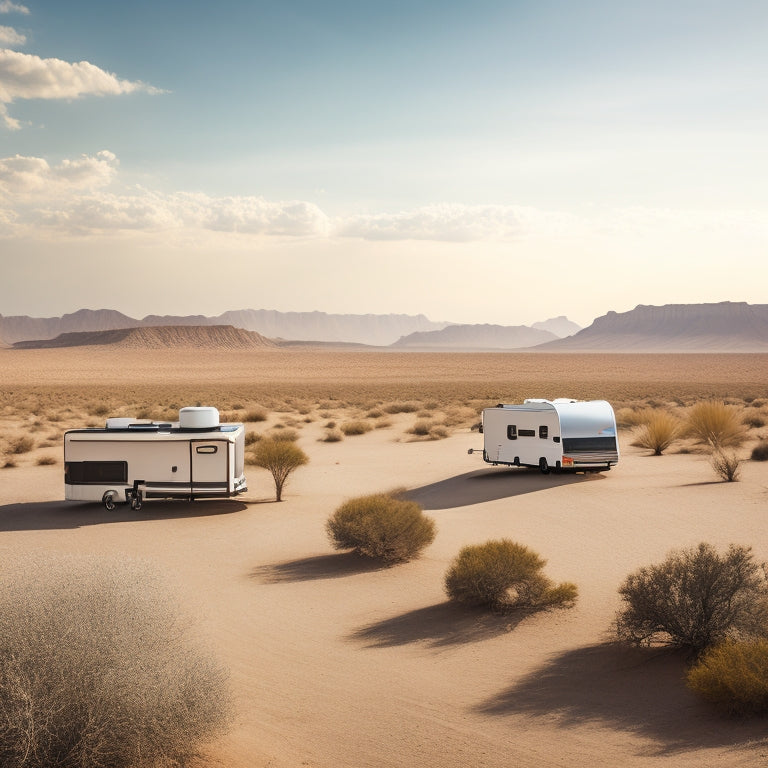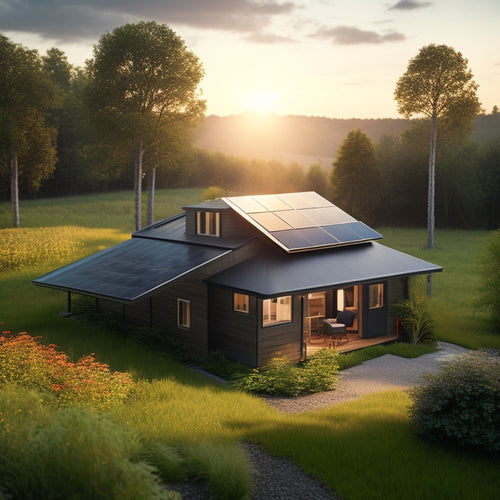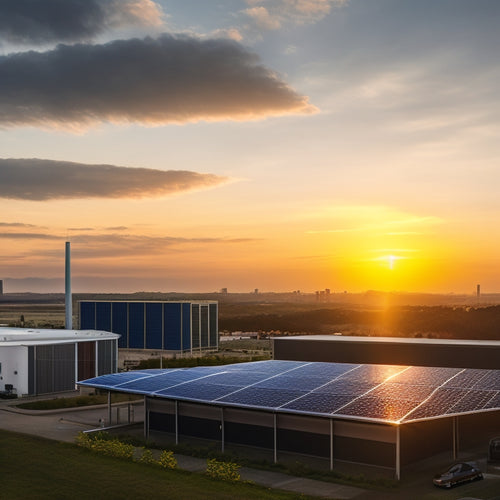
Top RV Off Grid Power Systems
Share
When designing your RV's off-grid power system, you'll need to carefully select components that work together seamlessly. Start with high-efficiency solar panels from top brands like Renogy, Zamp Solar, or HQST, paired with a reliable deep cycle battery like a lithium-ion option from Battle Born Batteries. Next, choose an inverter and charger that match your power requirements, prioritizing efficiency and surge capacity. Finally, verify your system is properly sized and installed, considering factors like load analysis, energy usage patterns, and solar regulations compliance. By carefully balancing these elements, you'll be well on your way to a reliable, customized off-grid power system that meets your unique needs - and there's more to investigate to maximize your setup's potential.
Key Takeaways
- For reliable off-grid power, prioritize a high-efficiency solar panel brand like Renogy or Zamp Solar to maximize energy output.
- Choose a suitable deep cycle battery type, such as lithium-ion or lead acid, based on your specific needs and budget.
- Select an inverter and charger with high efficiency (above 90%) and suitable continuous power output to minimize energy loss and ensure compatibility.
- Conduct a thorough load analysis and assess energy usage patterns to determine the minimum system capacity required for your RV's power needs.
- Ensure a well-designed and properly installed system, following local regulations and safety standards, to guarantee long-term reliability and optimal performance.
Essential Components of Off Grid Systems
As you initiate the design of an off-grid power system for your RV, identifying the essential components is crucial to guarantee a reliable and efficient energy supply.
You'll need to specify the right solar charge controllers, which regulate the flow of energy from your solar panels to your batteries. This confirms your batteries are charged safely and efficiently.
When selecting components, consider high-efficiency panels and durable mounting systems to guarantee peak performance.
Energy management is another critical aspect, as it allows you to monitor and control your energy usage. A reliable energy management system helps you enhance your power consumption, reducing the risk of battery drain or overload.
Top Rated Solar Panel Brands
With your RV's off-grid power system design underway, selecting the right solar panels is paramount to utilizing the sun's energy efficiently. You want panels that deliver superior solar efficiency and durability to guarantee a reliable power supply. To help you make an informed decision, here are top-rated solar panel brands that excel in these areas:
| Brand | Key Features |
|---|---|
| Renogy | High-efficiency cells, durable anodized aluminum frame |
| Zamp Solar | High-power output, waterproof connectors for added durability |
| HQST | High-efficiency cells, corrosion-resistant aluminum frame |
| WindyNation | High-output panels, durable construction for harsh environments |
| Rich Solar | High-efficiency cells, anodized aluminum frame for added durability |
When choosing a solar panel brand, consider factors like solar efficiency, panel durability, and warranty offered. By selecting a reputable brand, you'll guarantee a reliable power supply for your RV's off-grid excursions.
Deep Cycle Battery Options
You've carefully selected your solar panels, but now it's time to contemplate the heart of your RV's off-grid power system: deep cycle batteries.
When choosing a deep cycle battery, you'll likely face a challenging decision between lead acid and lithium-ion batteries. Lead acid batteries, the traditional choice, have several drawbacks, including limited cycle life, sensitivity to temperature, and low depth of discharge.
In contrast, lithium-ion batteries offer several advantages, such as higher energy density, faster charging, and longer cycle life.
Reliable for off-grid systems like those from Trojan Battery, and optimized for solar performance like Battle Born Batteries, are popular options. Additionally, lithium-ion batteries are more efficient, with a higher round-trip efficiency, resulting in less energy lost as heat.
With these benefits, lithium-ion batteries are becoming an increasingly popular choice for RV off-grid power systems.
Inverter and Charger Selection
Your deep cycle batteries are now chosen, but they're only half the equation; the inverter and charger are essential components that convert and regulate the flow of power in your RV's off-grid system. You'll need to select an inverter that suits your power requirements, considering factors like continuous power output, surge capacity, and efficiency. There are three main inverter types: pure sine wave, modified sine wave, and square wave. Modified sine wave inverters are the most common, offering a balance between cost and performance.
| Inverter Type | Characteristics |
|---|---|
| Pure Sine Wave | High-end, expensive, and suitable for sensitive electronics |
| Modified Sine Wave | Mid-range, cost-effective, and suitable for most appliances |
| Square Wave | Low-end, inexpensive, and suitable for simple devices only |
| Charger Efficiency | Look for chargers with high efficiency (>90%) to minimize energy loss |
When selecting a charger, prioritize efficiency, as it directly affects your system's overall performance. A high-efficiency charger will reduce energy waste and prolong your battery life.
System Sizing and Installation Tips
Three key components are now in place: deep cycle batteries, an inverter, and a charger.
Now it's time to guarantee they work together efficiently. You'll need to conduct a load analysis to determine your RV's power requirements. Calculate the total wattage of your appliances, lights, and other devices to determine the minimum capacity of your system.
Consider your energy usage patterns, too - will you need power during the night or just during the day? This analysis will help you optimize system efficiency.
Confirm solar panel system complies with solar regulations and safety standards solar regulations and plan for an off-grid lifestyle by generating sufficient power through a solar array.
When installing your system, verify proper ventilation, secure wiring, and protection from the elements. A well-designed and installed system will provide reliable off-grid power and extend the life of your components.
Frequently Asked Questions
Can I Use My Rv's Existing Electrical System With Off-Grid Power?
You can modify your RV's existing electrical system to work with off-grid power, but it'll require integrating solar panels and selecting suitable battery storage options that meet your energy needs and system compatibility.
How Often Should I Maintain and Inspect My Off-Grid Power System?
As you traverse the uncharted territories of self-sufficiency, your off-grid power system becomes a trusted compass, guiding you through the wilderness. You'll want to regularly recalibrate it by performing battery maintenance every 3-6 months and conducting solar panel inspections quarterly to guarantee peak performance.
Can I Add Wind Power or Hydro Power to My Off-Grid System?
You can integrate wind power by installing a wind turbine, and hydro power by adding a hydroelectric generator, but you'll need to take into account factors like turbine size, generator capacity, and system compatibility to guarantee seamless integration.
Are There Any Specific Electrical Codes for Off-Grid RV Systems?
You need to research off-grid regulations in your area, as electrical safety codes vary; guarantee compliance by following National Electric Code (NEC) standards and consulting with a certified electrician to avoid potential hazards.
Can I Use a Generator in Conjunction With My Off-Grid Power System?
As you traverse the uncharted territories of off-grid power, you're wondering if a trusty generator can join forces with your system. Rest easy, you can utilize its power, but confirm seamless generator compatibility and precise power management to avoid electrical harmony turning into chaos.
Related Posts
-

Diy Off Grid Solar
By embracing DIY off-grid solar, you can break free from grid dependence, slashing your energy bills by up to 90% and...
-

Solar Powered Lights for Sustainable Home Decor
Solar-powered lights offer a stylish and eco-friendly way to enhance your home decor. They capture sunlight, converti...
-

Advantages of Commercial Solar Battery On-Site Storage
By investing in a commercial solar battery on-site storage system, you can greatly reduce your energy grid dependence...


